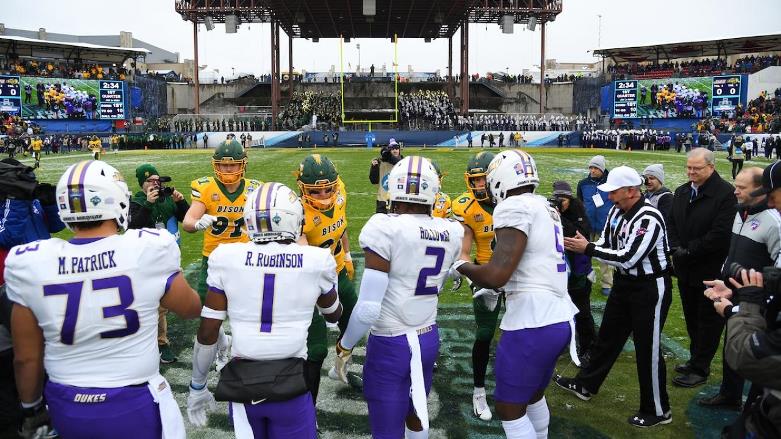Understanding the Fundamentals of FCS Football
What is FCS football? Football Championship Subdivision (FCS) football is a captivating and often overlooked part of college athletics in the United States. We’re diving deep into this exciting world to explore what makes FCS football unique, its rich history, and why it plays such an integral role in the collegiate sports landscape.
The Origins and Evolution of FCS Football

FCS football wasn’t always known by its current name. Let’s take a trip down memory lane to understand how this division came to be:
- The roots of FCS football can be traced back to 1978 when the NCAA decided to split Division I football into two tiers.
- Initially, it was called Division I-AA, while the upper tier was known as Division I-A.
- In 2006, the NCAA rebranded these divisions, giving birth to the Football Championship Subdivision (FCS) and the Football Bowl Subdivision (FBS).
This change wasn’t just cosmetic – it reflected a fundamental difference in how these two levels of college football operate and determine their champions.
Key Differences Between FCS and FBS
While both FCS and FBS fall under the NCAA Division I umbrella, there are several crucial distinctions:
- Championship Format: FCS teams compete in a playoff system to determine their national champion, while FBS relies on a committee-selected four-team playoff.
- Scholarship Limits: FCS programs are allowed to offer up to 63 full scholarships, compared to 85 for FBS teams.
- Budget and Resources: Generally, FCS programs operate with smaller budgets and fewer resources than their FBS counterparts.
- Media Exposure: FBS games receive more national television coverage, though FCS is gaining ground in this area.
These differences create a unique atmosphere and competitive landscape in FCS football that many fans find refreshing and exciting.
The Structure of FCS Football

Conferences and Teams
FCS football is a vast and diverse landscape, featuring:
- Over 120 teams spread across 13 conferences
- Several independent programs not affiliated with any conference
Some of the most prominent FCS conferences include:
- Missouri Valley Football Conference
- Colonial Athletic Association
- Big Sky Conference
- Southern Conference
- Ohio Valley Conference
Each conference has its own history, rivalries, and traditions that contribute to the rich tapestry of FCS football.
The FCS Playoff System
One of the most exciting aspects of FCS football is its playoff system. Here’s how it works:
- 24 teams qualify for the playoffs
- 10 conference champions receive automatic bids
- 14 at-large bids are awarded based on team performance
- Teams are seeded and play in a single-elimination tournament
- The championship game, known as the NCAA Division I Football Championship, is held in early January
This system ensures that the national champion is determined on the field, creating thrilling matchups and Cinderella stories that captivate fans.
The FCS Experience: More Than Just Football
Campus Atmosphere and Fan Engagement
FCS football offers a unique game-day experience that often feels more intimate and community-oriented than FBS games. We find that:
- Stadiums are typically smaller, creating a more personal atmosphere
- Ticket prices are often more affordable, making games accessible to a wider audience
- There’s a strong sense of school spirit and tradition at FCS games
This environment fosters a deep connection between the team, the students, and the local community.
Player Development and NFL Prospects
While FCS may not have the same level of national exposure as FBS, it has produced its fair share of NFL talent. Some notable FCS alumni include:
- Carson Wentz (North Dakota State)
- Jimmy Garoppolo (Eastern Illinois)
- Cooper Kupp (Eastern Washington)
These success stories demonstrate that FCS football is a viable path to professional football for talented and dedicated players.
The Financial Landscape of FCS Football
Budget Constraints and Creative Solutions
FCS programs often operate with significantly smaller budgets than their FBS counterparts. This financial reality leads to:
- More focused recruiting efforts
- Innovative fundraising strategies
- Efficient use of resources
- Emphasis on player development over flashy facilities
These constraints can foster a scrappy, underdog mentality that resonates with fans and players alike.
The Role of “Money Games”
To supplement their budgets, many FCS teams participate in “money games” against FBS opponents. These games:
- Provide a substantial payday for the FCS program
- Offer FCS players a chance to compete against top-tier talent
- Occasionally result in thrilling upsets that become part of college football lore
While these games can be challenging, they play a crucial role in sustaining many FCS programs.
Rivalries and Traditions in FCS Football
Historic Matchups and Heated Contests
FCS football is rich with longstanding rivalries that ignite passion in fans and players. Some notable rivalries include:
- Montana vs. Montana State – The “Brawl of the Wild”
- Harvard vs. Yale – “The Game”
- Lehigh vs. Lafayette – The most-played rivalry in college football
These matchups often transcend the game itself, becoming cultural events for the schools and communities involved.
Unique Traditions That Define FCS Football
From pregame rituals to postgame celebrations, FCS football is steeped in tradition. Some standout examples include:
- The “Fargodome Roar” at North Dakota State
- The “Running of the Bulls” at South Florida
- The “Flick of the Wrist” at James Madison University
These traditions create a sense of continuity and belonging for fans, alumni, and current students.
The Future of FCS Football

Challenges and Opportunities
As we look ahead, FCS football faces both challenges and opportunities:
- Increasing Media Exposure: Streaming services and regional networks are providing more coverage of FCS games.
- Financial Sustainability: Programs must find ways to remain financially viable in an increasingly competitive landscape.
- Talent Retention: With the transfer portal and NIL deals, keeping top talent at the FCS level may become more challenging.
- Expanding Playoff Format: There’s ongoing discussion about potentially expanding the playoff field to include more teams.
The Enduring Appeal of FCS Football
Despite these challenges, FCS football continues to captivate fans with its:
- Emphasis on regional rivalries
- Playoff system that guarantees an on-field champion
- Opportunities for upsets and Cinderella stories
- Strong connection to campus and community life
As long as these elements remain intact, FCS football will continue to hold a special place in the hearts of college sports fans.
Conclusion: The Heart and Soul of College Football
FCS football may not have the glitz and glamour of its FBS counterpart, but it embodies the true spirit of college athletics. It’s a world where passion, tradition, and community intersect to create a unique and thrilling sports experience.
Whether you’re a die-hard fan or a curious newcomer, FCS football offers something special. It’s a reminder that at its core, college football is about more than just winning – it’s about the joy of competition, the pride of representation, and the bonds formed through shared experiences.
As we’ve explored the ins and outs of FCS football, we hope you’ve gained a deeper appreciation for this often-overlooked tier of college sports. It’s a world full of excitement, drama, and heart – a true testament to the enduring appeal of college football in all its forms.
FAQs About FCS Football
How many FCS teams are there?
There are over 120 FCS teams spread across 13 conferences, with a few independent programs as well.
Can FCS teams play against FBS teams?
Yes, FCS teams often play against FBS teams in what are known as “money games” or “guarantee games.”
How many scholarships are FCS football programs allowed to offer?
FCS programs can offer up to 63 full scholarships, compared to 85 for FBS teams.
Who has won the most FCS national championships?
North Dakota State University has won the most FCS national championships with 9 titles as of 2023.
Can FCS players make it to the NFL?
Absolutely! Many FCS players have gone on to successful NFL careers, including stars like Carson Wentz and Cooper Kupp.


